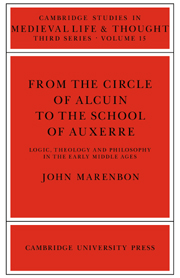 From the Circle of Alcuin to the School of Auxerre
From the Circle of Alcuin to the School of Auxerre Published online by Cambridge University Press: 24 October 2009
The best sources for late ninth – and early tenth-century discussion of the problems of the Categories, Universals and essence are the sets of glosses to three works: Martianus Capella's De nuptiis, Boethius's Opuscula Sacra and, by far the most important, the Categoriae Decem. It is no accident that these glosses, especially those to the Categoriae Decem, also provide some of the fullest testimony to Eriugena's influence on his immediate successors. Each of these sets of glosses poses problems of authorship, which cannot even be formulated correctly, unless careful attention is paid to the nature of glosses, as opposed to literary texts.
Early medieval glosses are evidence for the methods and concerns of teaching and learning, not their conscious finished products. Sets of glosses may, in some cases, have been copied into manuscripts by pupils at their teacher's dictation; or they may all have been copied from one manuscript to another by the teachers or their scribes. At all events, each glossed manuscript of a school-text is the record of the interests of a particular centre at a given time. Different copies of the ‘same’ set of glosses vary, not simply in their selection of glosses, but in the very level of interpretation they lend to their text.
To save this book to your Kindle, first ensure [email protected] is added to your Approved Personal Document E-mail List under your Personal Document Settings on the Manage Your Content and Devices page of your Amazon account. Then enter the ‘name’ part of your Kindle email address below. Find out more about saving to your Kindle.
Note you can select to save to either the @free.kindle.com or @kindle.com variations. ‘@free.kindle.com’ emails are free but can only be saved to your device when it is connected to wi-fi. ‘@kindle.com’ emails can be delivered even when you are not connected to wi-fi, but note that service fees apply.
Find out more about the Kindle Personal Document Service.
To save content items to your account, please confirm that you agree to abide by our usage policies. If this is the first time you use this feature, you will be asked to authorise Cambridge Core to connect with your account. Find out more about saving content to Dropbox.
To save content items to your account, please confirm that you agree to abide by our usage policies. If this is the first time you use this feature, you will be asked to authorise Cambridge Core to connect with your account. Find out more about saving content to Google Drive.